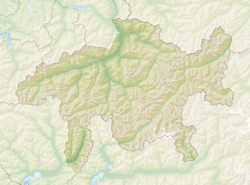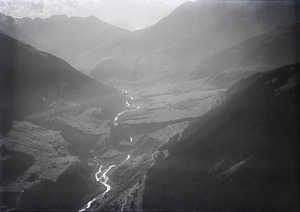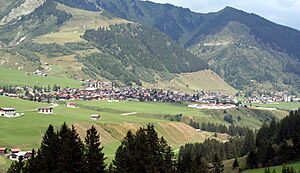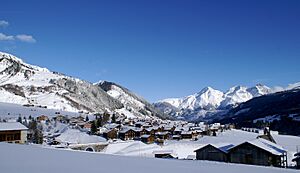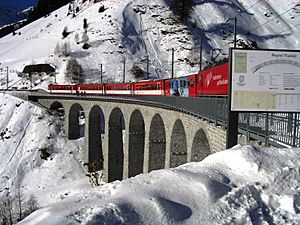Tujetsch facts for kids
Quick facts for kids
Tujetsch
|
||
|---|---|---|
|
Sedrun village
|
||
|
||
| Country | Switzerland | |
| Canton | Graubünden | |
| District | Surselva | |
| Area | ||
| • Total | 133.91 km2 (51.70 sq mi) | |
| Elevation | 1,450 m (4,760 ft) | |
| Highest elevation
(Péz Tgietschen)
|
3,327 m (10,915 ft) | |
| Lowest elevation
(Nislas)
|
1,230 m (4,040 ft) | |
| Population
(Dec 2020 )
|
||
| • Total | 1,183 | |
| • Density | 8.834/km2 (22.881/sq mi) | |
| Postal code |
7188
|
|
| Localities | Tschamut, Selva, Dieni, Rueras, Zarcuns, Camischolas, Gonda, Sedrun, Bugnei, Surrein, Cavorgia | |
| Surrounded by | Airolo (TI), Andermatt (UR), Disentis/Mustér, Gurtnellen (UR), Medel (Lucmagn), Quinto (TI), Silenen (UR) | |
Tujetsch is a small town, also called a municipality, in the Graubünden area of Switzerland. It's the westernmost town in this area. Tujetsch is connected to the canton of Uri by the Oberalp Pass, a mountain road. The town's name used to be Tavetsch until 1976.
Contents
History of Tujetsch
The upper Surselva valley, where Tujetsch is located, was first settled around the 800s. This happened after the Disentis Abbey was founded. The land was part of the abbey's feudal possessions, meaning the abbey owned and controlled it.
In the 1100s, a group of people called the Walser moved into the area. They came across the Oberalp Pass. The main church in Sedrun was first opened in 1205. For a long time, both the local Romansh people and the Walser lived in scattered homes, not in villages.
Over time, most Walser people started speaking the local Romansh language. But some German place names still remain from their language. In the 1700s, people began to gather and form villages around the churches. Many of the 66 scattered homes from the 1500s were left empty. Sedrun became the main village and the center of the municipality.
The local economy changed from farming in the mountains to making things like soapstone stoves and pottery. In the late 1800s, many people moved away, and the population dropped below 900. But in the early 1900s, tourism grew, and more people moved to Tujetsch. By 1950, the population was 1,122.
In the 1950s and 1960s, ski tourism became popular. Also, projects to create electricity from water (hydroelectricity) were developed.
The name Thiuesch was first used for the valley in 1237. The local way of speaking Romansh is quite different from the standard version. It's sometimes called its own dialect, Tuatschin. There was once a special breed of sheep called the Tavetsch sheep. It looked a lot like sheep from ancient times. This breed died out in 1954, but a project started in 1984 to bring it back.
Geography of Tujetsch
Tujetsch covers an area of about 133.9 square kilometers (51.7 square miles). A little over a quarter of this land (25.7%) is used for farming. About 10.8% is covered by forests. Only a small part (1.4%) has buildings or roads. The rest (62%) is made up of rivers, glaciers, or mountains.
Tujetsch is located at the start of the Oberalp Pass. It's also where the Vorderrhein river begins. The municipality includes the main village of Sedrun. It also has other areas like Tschamut, Selva, Rueras/Dieni, Camischolas/Zarcuns, Gonda, and Bugnei on one side of the Vorderrhein river. On the other side are Surrein and Cavorgia. Until 1920, there was no direct road connecting the villages on opposite sides of the river.
People of Tujetsch
Tujetsch has a population of about 1,500 people. About 29.1% of the people living here are from other countries. In the last ten years, the population has grown by about 25.1%.
Most people in Tujetsch (66.2%) speak Romansh. German is the second most common language (19.7%), and Italian is third (2.6%).
In 2000, about 60.2% of the population was male and 39.8% was female. About 9.2% of the people were children aged 0 to 9. Teenagers aged 10 to 19 made up 11.9% of the population.
When it comes to education, about 59.9% of adults (aged 25–64) have finished high school or gone on to higher education, like university.
Tujetsch has a low unemployment rate of 1.57%. Many people work in different types of jobs. About 56 people work in farming (primary sector). About 177 people work in manufacturing or construction (secondary sector). The largest group, 389 people, work in services like tourism, shops, or offices (tertiary sector).
Most people in Tujetsch (80.1%) are Roman Catholic. About 9.3% belong to the Swiss Reformed Church. There are also people who belong to the Orthodox Church, other Christian churches, and Muslims. Some people do not belong to any church.
The population of Tujetsch has changed over the years:
| Year | Population |
|---|---|
| 1850 | 979 |
| 1900 | 810 |
| 1950 | 1,122 |
| 1960 | 1,855 |
| 2000 | 1,525 |
The population grew a lot in 1960 because a power plant was being built, bringing more workers to the area.
Climate in Tujetsch
Tujetsch has a climate with cool summers and slightly cold winters. It rains or snows throughout the year.
| Climate data for Disentis/Sedrun (1981–2010) | |||||||||||||
|---|---|---|---|---|---|---|---|---|---|---|---|---|---|
| Month | Jan | Feb | Mar | Apr | May | Jun | Jul | Aug | Sep | Oct | Nov | Dec | Year |
| Mean daily maximum °C (°F) | 2.3 (36.1) |
3.1 (37.6) |
6.8 (44.2) |
10.4 (50.7) |
15.3 (59.5) |
18.9 (66.0) |
21.4 (70.5) |
20.5 (68.9) |
16.7 (62.1) |
12.9 (55.2) |
6.2 (43.2) |
2.9 (37.2) |
11.5 (52.7) |
| Daily mean °C (°F) | −1.4 (29.5) |
−1.1 (30.0) |
2.0 (35.6) |
5.4 (41.7) |
10.0 (50.0) |
13.2 (55.8) |
15.5 (59.9) |
14.9 (58.8) |
11.6 (52.9) |
8.0 (46.4) |
2.4 (36.3) |
−0.5 (31.1) |
6.7 (44.1) |
| Mean daily minimum °C (°F) | −4.6 (23.7) |
−4.6 (23.7) |
−1.8 (28.8) |
1.3 (34.3) |
5.6 (42.1) |
8.3 (46.9) |
10.6 (51.1) |
10.5 (50.9) |
7.5 (45.5) |
4.4 (39.9) |
−0.6 (30.9) |
−3.5 (25.7) |
2.8 (37.0) |
| Average precipitation mm (inches) | 68 (2.7) |
58 (2.3) |
68 (2.7) |
84 (3.3) |
115 (4.5) |
106 (4.2) |
112 (4.4) |
121 (4.8) |
114 (4.5) |
88 (3.5) |
99 (3.9) |
66 (2.6) |
1,101 (43.3) |
| Average snowfall cm (inches) | 81.1 (31.9) |
71.3 (28.1) |
54.6 (21.5) |
37.9 (14.9) |
9 (3.5) |
0.8 (0.3) |
0 (0) |
0 (0) |
1 (0.4) |
11.6 (4.6) |
51 (20) |
63.4 (25.0) |
381.7 (150.3) |
| Average precipitation days (≥ 1.0 mm) | 8.4 | 7.8 | 9.3 | 8.9 | 11.8 | 11.9 | 11.4 | 12.5 | 9.5 | 8.8 | 9.4 | 9.0 | 118.7 |
| Average snowy days (≥ 1.0 cm) | 10.2 | 9.6 | 8.2 | 5.4 | 1.1 | 0.2 | 0 | 0 | 0.1 | 1.3 | 6.9 | 9.1 | 52.1 |
| Average relative humidity (%) | 68 | 67 | 67 | 66 | 67 | 69 | 69 | 72 | 73 | 71 | 73 | 71 | 69 |
| Mean monthly sunshine hours | 87 | 98 | 131 | 130 | 143 | 167 | 195 | 181 | 154 | 120 | 79 | 73 | 1,557 |
| Source: MeteoSwiss | |||||||||||||
Notable People from Tujetsch
- Felix Maria Diogg (1762–1834), a famous portrait painter who painted people's faces.
See also
 In Spanish: Tujetsch para niños
In Spanish: Tujetsch para niños
 | Tommie Smith |
 | Simone Manuel |
 | Shani Davis |
 | Simone Biles |
 | Alice Coachman |




